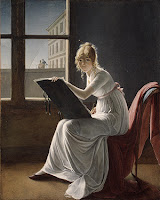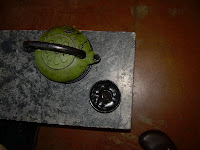 |
| Jo Beverley |
Joanna here, and an interview with the illustrious Jo Beverley, bestselling author of over 30 Historical Romances, one of 12 members of the RWA Hall of fame, and just a really cool writer.
Her latest book,
A Scandalous Countess, came out yesterday and she's agreed to talk about it a little, down there at the bottom.
Me: A Historical Romance novelist needs to be a historian, a storyteller, and a technically skilled writer. Tell us a little about how you balance these three parts of your writing.
Jo Beverley: What an interesting question! The historian side can be the most dangerous. It can suck me into research for the sake of research (and what's wrong with that? it protests) and used to tempt me to structure a book around some neat knowledge instead of the characters and the love story. I think I've won that battle, at least. I don't see a distinction between technical skill and storytelling, because I believe that anything that enhances the story, even incomplete sentences, dangling participles et al, is excellent technique for storytelling.
Me: Did you come across any new and exciting historical tidbits while you were researching *A Scandalous Countess*?
Jo Beverley: That fish could block London's water system!
I simply wanted to show Georgia being practical in her position as a patroness of a charitable home, but doing what? The water supply seemed a nicely down-to-earth one, but I had to research it. (And wasn't that fun, whispers the research demon.) Most prosperous homes had water supplied a few times a week, but it came from the minor rivers, so sometimes a fish or eel blocked the pipe. Of course people didn't drink water unless they could afford to have it come by barrel from a pure source, like the chalk Downs.
In the 18th century they drank small beer and later they drank tea. The secret? Both involved boiling the water. I remember my grandmother insisting that the steam must come out of all the vents on the kettle for at least a minute before pouring the water into the pot. I just put it down to an obsession with the water being hot enough, but now I think perhaps it was old wisdom of how to be sure the water was safe.
Me: Your next book, A Scandalous Countess, is set in 1765. Why do you choose to write in the Georgian period?
I fell in love with the Georgian period through Heyer's Georgians. Above all, it's the Georgian men I love. Strong men in plain dark clothing make me yawn, and I wrinkle my nose at stubble, but put them, well polished, in silken finery and I melt. Put them in high heels and they're even yummier, especially when they're carrying a sword and will kill with it if they have to.
It's also an exciting period all around. It's the period of the Enlightenment, when any idea was to be analyzed, questioned, and if necessary discarded for a better way, and I'm talking about the upper classes here, who led the explorations. The Georgian aristocracy could be wild, greedy and corrupt, but in general they weren't lazy. Intellectual curiosity was fertile ground for the age of revolutions -- the agricultural and industrial as well as the political.
Me: What do you like least about this era? What are the hardest realities you find yourself 'writing around'?

You ask devilish questions! It was harsh for the weak and vulnerable, though to be fair many of the wealthier people worked hard to help. Politics was dirty and at times chaotic, which can be great for plots, and in fact, though the surface is smoother now, has much changed? Women lacked many rights and were vulnerable to abuse.
The area I write around is medical. That's not the fault of the Georgian age and things don't improve much for the next century or so, but my characters in all periods have good teeth and good health. If they get wounded I try to make it plausible that they can recover without lingering effect.
The greatest danger from lesser wounds was infection and sewing a wound would have horrified a doctor of the time as it hid any infection. The wound was, if necessary, held open until safe. That's from the first edition of the Encyclopedia Britannica, 1768, which is available as a replica. I keep promising myself I'll read it cover to cover. It's fascinating.
Me: In A Scandalous Countess, your heroine has unfairly lost her reputation in 'Society'. Why does this matter? How important was this reputation thing, really?

In my opinion many historical romances overplay the lost reputation card by using it to force marriages over a kiss, for example, but a real scandal definitely left a stain, on men as well as women. There would be places where they weren't welcome and many people who would avoid them. George III was quite sticky about who was welcome at court, and access to court was seen as crucial in the beau monde. Some people wouldn't care about that, but others would be devastated, which is true today. Some in that situation chose exile.
Georgia has been accustomed to a very high and very comfortable position. She's not willing to contemplate exile and is focused on proving her innocence and getting her life back.

Me: If you were to join your fictive world; if you could become one of your characters -- even a minor character -- who would you be?
Temporarily or permanently? I think I'd be Elf Malloren for a while -- Lady Elfled Malloren as was, now Lady Walgrave, heroine of Something Wicked. She's fun, active, and would take me into the heart of the Malloren family as well as all over fashionable society.
Me: Tell us about your latest novel, A Scandalous Countess, that hit the stands yesterday.
As I indicated above, it's about a young, beautiful countess who wakes up to find her delightful life in ruins. Her husband has been killed in a duel and rumor whispers that it was fought over her. In addition to the scandal, because she hasn't borne an heir, she's lost her homes and her husband's wealth.

Her powerful family whisk her back to the family home for a year of demure mourning, but the scandal won't die, so in due course she determines to return to London, establish her innocence and get her life back -- ie find another rich, highly titled man to marry.
But then there's Lord Dracy, a scarred ex-naval officer. Georgia's father has asked her to help Dracy adjust to society, and she agrees out of kindness, but he's not the "beached tar" she expects. Instantly she likes him and soon she's attracted to him. There's no future in that, however, because he lacks a high title, money, and perhaps worse actually enjoys living in the country!
When it becomes clear that someone won't let the scandal die Dracy is her strongest ally. But how can they have a truly happy ending?
Thanks for much for dropping by the blog, Jo.
A Scandalous Countess, takes place in the Malloren Fictive World. I'm looking forward to reading it.
Buy
A Scandalous Countess at
Amazon,
B&N,
kindle,
nook, or
Powells, and wherever fine books are sold.
Jo Beverley is GIVING AWAY a hot-off-the-presses copy of
A Scandalous Countess to one lucky reader in the comments field. Come tell us what you think of Scandal in the world of Georgian England.















































